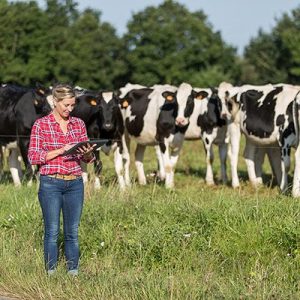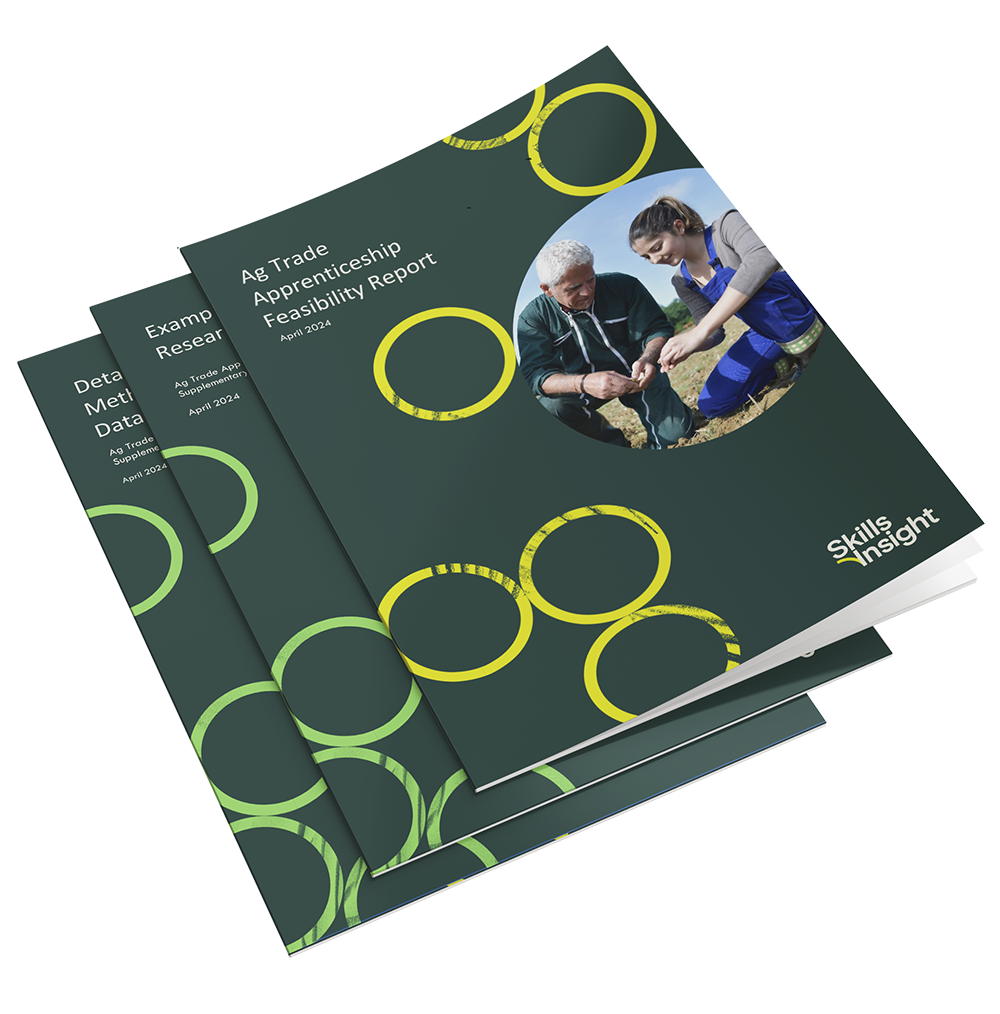An agricultural trade apprenticeship has the potential to improve the industry’s capacity to highlight its diverse career pathways and recruit and retain its future workforce.
Click across the tabs to view active and completed project stages. Consultation takes place at every stage of the project.
Recommendations for an agricultural trade pathway have been made by the Agricultural Workforce Working Group, the National Agricultural Labour Advisory Committee in the National Agriculture Workforce Strategy, and the National Farmers’ Federation in their 2030 Roadmap.
This project will investigate establishing an agricultural apprenticeship pathway.
Research will be conducted in collaboration with industry stakeholders, training providers, government bodies, and other relevant parties to thoroughly explore the feasibility and viability of trade apprenticeships in agriculture. The research methods will include surveys, workshops, and stakeholder consultations to gather insights, experiences, and supporting evidence.
As part of the above consultation and research process, the project will identify various options for a potential apprenticeship model within the agricultural sector.

Please feel free to register your interest in project updates and consultation opportunities by contacting the project manager, Andrew Horgan at [email protected]. You are also encouraged to subscribe to project updates through our newsletter.

Research is being conducted as part of this project into the feasibility of a trade apprenticeship in agriculture and what a potential apprenticeship model could look like for the industry. Skills Insight has been engaging in activities to promote the project and make contact with interested parties.
A steering committee of employers, industry bodies, unions and other relevant parties has been established to support the project and process of gathering evidence so that it is undertaken in a clear and transparent manner as per industry expectations. The committee will have its first meeting in late September.
Organisations involved in the steering committee include:
Development outcomes and next steps

A series of workshops will be held around the country in October to discuss various options for a potential apprenticeship model.

Further opportunities to provide input into the research will take place in the form of surveys and interviews.

A report with findings and recommendations of the research is due for delivery late March 2024.
Please feel free to register your interest in project updates and consultation opportunities by contacting the project manager, Andrew Horgan at [email protected]. You are also encouraged to subscribe to project updates through our newsletter.
Research has been undertaken throughout this project into the dynamics of a trade apprenticeship in agriculture to help attract new entrants and promote career pathways in agriculture.
Thank you to everyone who has participated in the project to date via in-person and online consultation sessions, a survey, interviews, emails and phone calls. Your feedback is being used to inform a report presenting advice for how an agricultural trade apprenticeship could be implemented.
Next steps
The project Steering Committee has provided input into the report and it is being shared with the Department of Employment and Workforce Relations and the Agriculture Workforce Forum to provide guidance on potential options.
Your experiences and knowledge provide invaluable insights for this complex project, and we are happy to receive any related feedback at any time. You are welcome to contact the project manager, Andrew Horgan, at [email protected]
Consultation to Date
At the commencement of of this project a Steering Committee of employers, industry bodies, unions and other relevant parties was established to guide research throughout the project.
In October and November 2023, Skills Insight ran consultation workshops, including 10 face to face workshops in major agricultural production locations across each state and territory and three online workshops. Each workshop included a workforce functional analysis (WFA) in either broadacre cropping, diary production or livestock production, in which participants were asked to identify and/or confirm the typical job functions undertaken by trade level workers in these sectors. The workshops also included discussions to consider implementation of the model, including market and financial considerations.
Over December 2023 and January 2024, feedback was sought via a survey. Stakeholder input was collected on the potential benefits of an apprenticeship in agriculture, as well as considerations around the dynamics that must be addressed for long-term success of such a program. An example qualification that can be delivered as an apprenticeship was developed and made available for feedback. We encouraged feedback on the structure of the qualification, whether anything is missing, or areas that could be streamlined. Skills Insight also conducted individual interviews with employers to gain further insights into the requirements of a fit-for-purpose agricultural trade apprenticeship.
Previous in person workshops
Previous online workshops
Skills Insight has engaged with stakeholders across the country to investigate how an agricultural trade apprenticeship could be implemented to help attract new entrants and promote career pathways in agriculture.
Research focused on the dynamics of a trade apprenticeship in agriculture. The research insights have been summarised to produce an Ag Trade Apprenticeship Feasibility Report.
The report was reviewed and approved for publication by the Agricultural Workforce Forum, the Minister for Agriculture, Fisheries and Forestry the Hon Murray Watt and the Department of Employment and Workplace Relations, between April and June 2024.

Three supplementary reports have also been developed. The detailed research methodology used for the project and the key data gathered as a result are outlined in Supplementary Report 1 . The example qualification research and testing that took place throughout the consultation workshops can be found in Supplementary Report 2 which also includes a sample qualification. Supplementary Report 3 is a guide to recognising apprenticeships and traineeships collating information and viewpoints provided by state and territory bodies about the process of establishing an apprenticeship or traineeship based on a VET qualification in each Australian jurisdiction.
Thank you to everyone who has participated in the project via in-person and online consultation sessions, a survey, interviews, emails and phone calls.
Project Insights
There is significant support for the development of an Ag Trade Apprenticeship among industry participants, including employers, unions and trainers. There were also some concerns raised about whether the introduction of a new and untested program could potentially compromise successful training pathways that are currently in place.
However, there is considerable evidence to suggest that, with the right implementation and support mechanisms in place, an Ag Trade Apprenticeship could be an attractive pathway for new entrants, increase the professionalism in the industry, improve safety performance, and help to alleviate current and future skill shortages.
The research suggests that an Ag Trade Apprenticeship would have the greatest chance of helping to alleviate the skills and labour shortages being experienced in agriculture, build the future workforce, provide people with access to secure, fairly paid jobs, and remove barriers to employment with a multi-pronged approach including:
Potential Next Steps
The report outlines a number of steps that need to be taken for the successful implementation of an Ag Trade Apprenticeship. There are potential future projects that Skills Insight can lead as a Jobs and Skills Council to advance the process. These could include career pathway mapping and the development of an apprenticeship qualification and training materials to support its delivery. Potential projects are subject to evidence of continuing industry support, training delivery viability for one or more RTOs and Department approval to keep things moving towards an Ag Trade Apprenticeship.
Summary of Consultation
At the commencement of this project a Steering Committee of employers, industry bodies, unions and other relevant parties was established to guide research into the dynamics of an Ag Trade Apprenticeship.
Skills Insight ran consultation workshops, including 10 face to face workshops in major agricultural production locations across each state and territory and three online workshops with each including a workforce functional analysis (WFA) in either broadacre cropping, diary production or livestock production. The WFAs were part of example qualification research and testing which resulted in a sample qualification being developed and made available for stakeholder feedback as part of the project.
Feedback was also sought via a survey with stakeholder input collected on the potential benefits of an apprenticeship in agriculture, as well as considerations around the dynamics that must be addressed for the long-term success of such a program. Skills Insight also conducted individual interviews with employers to gain further insights into the requirements of a fit-for-purpose agricultural trade apprenticeship.
Project background
In 2023 an Agricultural Workforce Working Group was established as a result of the 2022 Jobs and Skills Summit. It was facilitated by the Department of Agriculture and brought together by the Commonwealth Agricultural Minister, Senator the Hon Murray Watt. This working group has met eight times since the Jobs and Skills Summit to look at a range of labour and workforce skill challenges and solutions.
The Minister for Agriculture, Fisheries and Forestry, the Hon Murray Watt stated that, ‘A key priority of the Working Group has been to identify opportunities to uplift capability of workers and employers in agriculture.’ Considering the establishment of a trade apprenticeship pathway in the agriculture sector which would complement the existing VET offerings is at the heart of this research.

Previous to the work of this working group, a National Agriculture Workforce Strategy was released in 2020 which recommended that stakeholders meet ‘in order to develop a flagship AgriFood apprenticeship and traineeship scheme with training providers. The scheme should address issues of employer demand and allow flexibility for employers such as the sharing of apprentices and/or trainees among small to medium businesses.’
In 2018 the National Farmers’ Federation also outlined the need for a trade apprenticeship pathway in their 2030 Roadmap under Pillar 4.1.3, to ‘Establish a nationally consistent, “trade-equivalent” job brand for skilled farm workers’.
This project is part of the Annual Training Product Development Plan 2023-24.